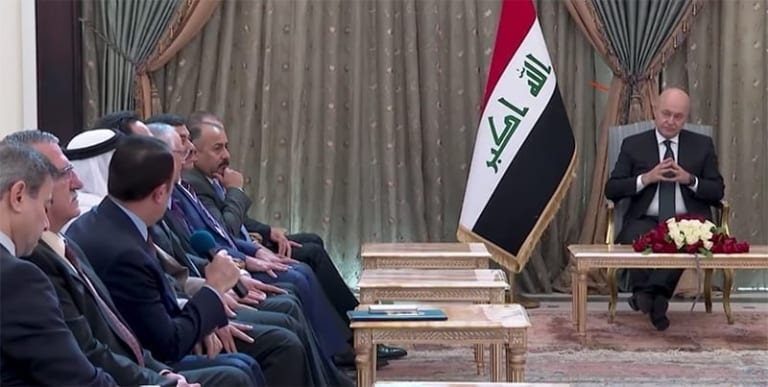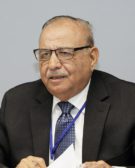
Conditions in Iraq have deteriorated recently, adding to the high degree of tension among its political forces and between some of them and the United States. Iraqi politicians are confronting a dire need for a clear and effective strategy to pull their country out of its downward spiral. In the weeks and months ahead, they are called upon to shoulder the responsibility of steering their country out of the abyss that they participated in creating over years of neglect, opportunistic maneuvering, and brinkmanship.
Iraqi Realities
Several developments have helped exacerbate the current deterioration. First, over the last few months the political class has failed to form a credible and strong government, in the process helping to erode central authority at a crucial time. Simultaneously, demonstrators—in the streets since last October—continue to protest living conditions and to demand a voice in governance as security forces maintain oppressive tactics against them. During the last two months, even militias have tried to end public protests, which they see as potentially impacting their interests in the political system.
Second, there has developed a clear and deep schism between the entrenched Shia political forces, reflecting old divisions and interests. What has abetted this development is the intrusion of money and patronage on social relations to alter popular loyalties and political fealty. Aggravating this situation among Shia forces is the entrenchment of powerful militias on good terms with Iran, receiving their financial and military support from the Islamic Revolutionary Guard Corps (IRGC). They have forced themselves on government institutions and succeeded in securing long-term positions and interests in the bureaucracy and security services. With them grew a renewed Iranian influence on Iraqi decision making, made more important today after the US killing of Quds Force Commander Qassem Soleimani on January 2, 2020.
There has developed a clear and deep schism between the entrenched Shia political forces, reflecting old divisions and interests.
Third, there now appears to be ambiguity about who will inherit Soleimani’s role in Iraq. At the time of his assassination, Iran relied on Lebanon’s Hezbollah to coordinate relations with its militia allies in Iraq. Other contenders to succeed Soleimani in this capacity are Iran’s ambassador to Iraq, Iraj Masjedi, and the IRGC’s coordinator in Yemen, Abdul Reza Shahlai. This remains a challenging factor in Iraqi politics despite Iran’s problems resulting from American sanctions and the coronavirus pandemic, which has infected more than 30,000 people and killed some 2,300 others in the country.
Fourth, Iraq––like all other members of the Organization of Petroleum Exporting Countries––has found itself on the receiving end of a brutal oil war between Saudi Arabia and Russia, one that it cannot influence or mitigate. The effects of this war are likely to impact how the country manages its many political, economic, and social problems.
To be sure, political conditions in Iraq today can be described as fractious, with militia forces exerting inordinate influence and practically sidelining the rule of law, thus rendering state institutions ineffective. Such a situation clearly leads to domestic crises that impact Iraq’s regional and international relations.
State Weakness and Militia Rule
Iraq’s militias are organically connected with the Quds Force of Iran’s IRGC, which was led by the late Soleimani but continues to operate now under the leadership of General Esmail Qaani. They are highly organized, well equipped, and number in the tens of thousands. In 2014, an attempt to fold them under a single umbrella, the Popular Mobilization Units (PMU), led to their recognition as an official arm of the state’s military force; former Prime Minister Haider al-Abadi issued a decree to that effect in 2018. Yet, despite this status, many still owe allegiance to Iran’s Supreme Leader Ali Khamenei through their relationship with the IRGC’s Quds Force.
Iraq’s militias are organically connected with the Quds Force of Iran’s IRGC, which was led by the late Soleimani but continues to operate now under the leadership of General Esmail Qaani.
In 2019, the strength and reach of these militias increased with their incorporation into the security forces and closeness to the state’s institutions and its economy, dependent as it is on the oil sector. In the last parliamentary elections, they were able to secure a large representation in the Chamber of Deputies. Their leader there is Hadi al-Amiri who heads the second largest contingent and led the latest call for expelling US troops from Iraq following Soleimani’s killing (and that of the PMU’s Abu Mahdi al-Muhandis). The first such parliamentary bloc, Saeroun, is led by Muqtada al-Sadr who heads Saraya al-Salam, formerly the Mahdi Army that fought US troops after the invasion of Iraq. Interestingly, there also are Sunni tribal militias that are associated with the PMUs and benefit from American and Iraqi state largesse.
The power and influence of the Iran-friendly militias began to increase in 2019 as tension between the United States and the Islamic Republic heightened. The militias began to supplant the central government’s decision-making regarding the American presence in Iraq and in fact started to organize military operations against US troops, eliciting retaliatory attacks against their bases that culminated in the American assassination of Soleimani and Muhandis. The crisis between the militias and American forces, one precipitated by mutual attacks that continue today, has created an untenable situation for the Iraqi government, which found itself caught between trying to satisfy Washington and Tehran simultaneously. Unable to do either, the caretaker government of Prime Minister Adel Abdul-Mahdi found itself presiding over an almost failed state. The United States also discovered that its influence on events in Baghdad has waned, especially when militias targeted the Iraqi Taji military base and killed two American and one British troops, prompting US Secretary of State Mike Pompeo to warn Abdul-Mahdi about the consequences of such attacks.
Indeed, the militias in Iraq have succeeded in playing a spoiler role in the country and, so far, have practically obstructed the constitutional process to choose a new prime minister. Their interference in this matter has followed two prongs. The first was to try to force their own candidate into the position, a situation that cannot be accepted by other political forces and the United States. The second was to threaten President Barham Saleh so that he would not choose anyone of whom they do not approve. In the end, Saleh went ahead and used his constitutional prerogatives and chose the former governor of Najaf governorate Adnan al-Zurfi to form the new cabinet.
Choosing a New Prime Minister
The continuing demonstrations for better living standards and fighting corruption in Iraq resulted in depriving Abdul-Mahdi of much needed street support, especially that most of the protesters who began their agitation for change are from the southern Shia-majority governorates. The protesters’ demands also included ending the control by the entrenched political class that, in addition to being corrupt and ineffective, could not agree on a new prime minister. In fact, the delay in choosing such a person was partly because Sadr and Amiri could not agree on a mutually acceptable candidate and partly because a new candidate must receive the support of the Sunnis and the Kurds in the political system. Mohammed Tawfiq Allawi, Saleh’s choice prior to Zurfi, failed to form a new government without the support of Sadr, the Sunnis, and the Kurds—they all distanced themselves because of his background as a member of one of former Prime Minister Nouri al-Maliki’s cabinets. Additionally, Allawi could not offer the necessary incentives to everyone in parliament by promising government positions or largesse, as Iraq’s power-sharing political arrangement requires.
Zurfi’s good relations with Washington are most likely to make his tenure difficult if he succeeds in forming a government, especially that he promises to push through a secular agenda in an environment that has become accustomed to religious politics and sectarian power-sharing.
Saleh’s choice of Zurfi is still unwarranted. The former governor of Najaf has a dual Iraqi- American citizenship and was appointed to that position by Paul Bremer, the head of the post-2003 invasion’s Provisional Coalition Authority. As governor, he had a hard time with the Sadrists; but he is perceived as having a clean record. His good relations with Washington are most likely to make his tenure difficult if he succeeds in forming a government, especially that he promises to push through a secular agenda in an environment that has become accustomed to religious politics and sectarian power-sharing. It is certainly hard to say how he will fare but he most assuredly will find himself confronted by pro-Iran militias and personalities.
A Collapsed Economy
Zurfi’s tenure will additionally be challenged by a deteriorating economic landscape in a country where corruption is rampant and where it is uncertain if government expenditures will lead to development reconstruction after long years of war and instability. In 2019, Iraq ranked 162 out of 180 on Transparency International’s Corruption Perception Index, with a poor score of 20 out of 100 (zero is worst) on public sector corruption. Militias and parties have also interfered in economic decision-making in order to benefit from the government’s financial coffers and have engaged in oil smuggling out of the same legal ports the government uses to export its own oil.
The ongoing oil production and price war between Saudi Arabia and Russia has negatively affected Iraq. With prices hovering around $20 a barrel, Iraq’s budget has already taken a deep hit.
Today, the ongoing oil production and price war between Saudi Arabia and Russia has negatively affected Iraq. With prices hovering around $20 a barrel, Iraq’s budget has already taken a deep hit. The country depends on its oil exports for some 95 percent of its expenditures, necessitating a recent decision to halt projects and borrow in order to pay public employees. With other sectors of the economy––industry, agriculture, tourism––suffering from years of war and neglect and, now, the coronavirus pandemic, the country cannot compensate for the loss of oil revenues. This will not only have social repercussions but is bound to affect how the new government, if and when it is formed, will be able to navigate the very complicated political environment.
It is thus high time for Iraqi politicians to put aside their differences and concentrate on how to avoid the coming catastrophes of a failed state, a collapsed economy, and malevolent outside interference. If Prime Minister-designate Adnan al-Zurfi has a chance in addressing the many ills besetting Iraq, he will need the collective efforts of all political forces, specifically those affiliated with Iran, as well as assistance from the Trump Administration to find the requisite compromises that can serve Iraq’s peace and stability.

